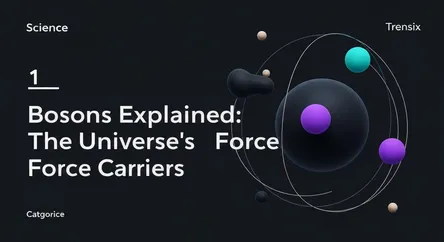Science
Bosons Explained: The Universe's Force Carriers

An introduction to bosons, the fundamental particles that carry forces and give mass to matter, and how their study impacts our technology.
What is it?
A boson is a fundamental particle and one of two main classes of particles in the universe, the other being fermions. Named after physicist Satyendra Nath Bose, bosons are often called "force-carrying particles." For example, photons are bosons that carry the electromagnetic force, while gluons carry the strong nuclear force that holds atomic nuclei together. The famous Higgs boson is a unique type that gives other fundamental particles their mass. Unlike fermions (which make up matter like electrons and quarks), multiple bosons can occupy the exact same quantum state. This "sociable" property is what makes phenomena like lasers (a beam of identical photons) and superfluids possible.
Why is it trending?
Bosons are at the heart of modern physics research. The 2012 discovery of the Higgs boson at the Large Hadron Collider (LHC) was a monumental achievement that confirmed the Standard Model of particle physics, our best theory for describing the fundamental building blocks of the universe. Scientists continue to study the Higgs boson and search for other, undiscovered bosons that could explain mysteries like dark matter. Furthermore, the strange quantum behavior of bosons is being harnessed for new technologies. Research into Bose-Einstein condensates, a state of matter where atoms act as one "super atom," and boson sampling are pushing the boundaries of quantum computing and materials science.
How does it affect people?
Directly, a single boson has no noticeable effect on daily life. However, the pursuit of understanding them has driven technological revolutions. The need to detect these particles led to the development of advanced sensors and accelerators now used in medicine for cancer treatments (hadron therapy) and high-resolution medical imaging like PET scans. The massive data challenges from experiments at CERN led to the invention of the World Wide Web, which was created to help physicists share information. Ultimately, studying bosons helps us answer fundamental questions about how the universe works, from the nature of forces to the origin of mass.